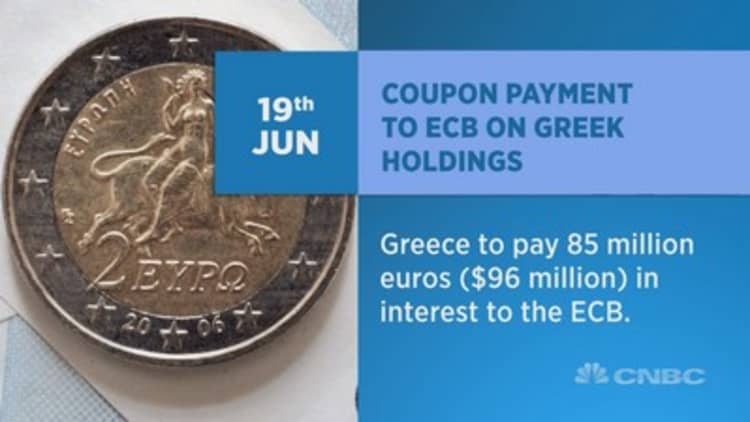
The future of Greece continues to dominate global markets as the country nudges ever closer to a debt default.
Indeed, the Greek central bank warned on Wednesday that Greece would be on a "painful course" towards default and an exit from the euro zone if the government and international creditors failed to reach an aid-for-reforms deal.
But just how important is Greece to the world economy—and would it matter if it defaulted?
Here are some things to consider:
Economy
Greece's economy has shrunk by 25 percent since 2009 and is not a big contributor to global growth. It makes up roughly 2 percent of the euro zone economy.
Read MoreInvestors brace for more volatility as Greece eyes default
While the Greek economy is expected to suffer further from the turbulence, the broader European economy has some pretty strong buffers in place to support it—the euro is down 20 percent from where it traded a year ago, oil prices remain well below their peaks hit last year above $100 a barrel and the European Central Bank (ECB) has a 1 trillion euro ($1.1 billion) monetary stimulus program in place.
Contagion
The word that comes up again and again in relation to the Greek crisis. Contagion risks, analysts say, should not be underestimated, but are lower than at previous flashpoints in the Greek crisis.
There are two reasons for this, the first being that public bodies such as the International Monetary Fund (IMF), rather than private institutions, are now the big holders of Greek government debt. That should help limit any ripple effects from a default.
Greece has a 1.6 billion euro ($1.8 billion) debt repayment to make to the IMF on June 30 and another big payment to the ECB due in July.

"We know who the big owners of Greek government bonds are—the IMF and ECB—and we know they have deep pockets," said Julian Jessop, chief global economist at Capital Economics. "We wouldn't worry about the solvency of the IMF or ECB if Greece defaults."
The second reason why contagion risks from Greece are viewed differently from a few years ago is that the ECB has set up institutions to come to the aid of any member state in trouble. The central bank also has a 1 trillion euro ($1.1 trillion) monetary stimulus program in place and other smaller euro zone economies such as Portugal and Spain have taken steps to strengthen their banking systems.
Geopolitics
Given its membership of the North Atlantic Treaty Organization (NATO) military alliance and its location near to the Middle East and not far from Russia, Greece is a surprisingly important country in geopolitical terms. Thus a default that raises questions about its future in the euro zone is something to watch.
Read MoreGreek central bank warns of 'Grexit'
"It is pretty clear that the U.S. and EU officials do not want a failed state on their hands at a time that Greece is on the forefront of a number of geopolitical fault lines, with the volatile Middle East situation as well as concerns about a pivot to Russia," Michael Hewson, chief market analyst at CMC Markets UK, said in a note on Tuesday.
Markets
The fact that a default in Greece has been anticipated for some time means that the actual event would be unlikely to come as a huge surprise to global markets, or have a destabilizing impact to the degree that the collapse of U.S. investment bank Lehman Brothers did in 2008.
"Lehman was a real shock it came out of the blue, but the Greek crisis has been rumbling on for years, so a Greek default in itself won't be a huge shock," said Jessop at Capital Economics.
"It's more a Greek exit from the euro and others following that's a worry; then you're talking about the future of the world's second most important currency after the dollar," he added.


